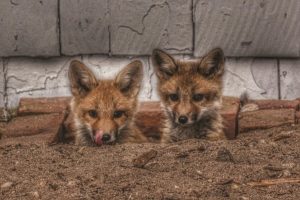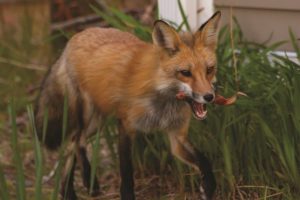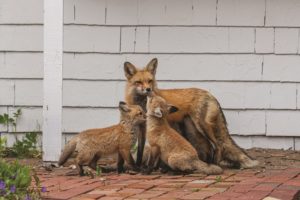PROVINCETOWN — Carrie Medina Notaro first noticed the female red fox in her East End neighborhood in early January and began having “conversations” with her.
Notaro realized that the female was pregnant, and soon located the den under a nearby house; the litter eventually totaled five kits. She named each one — the last, and smallest, “Runtlestiltskin,” or “Runtie,” for short.

She spent a great deal of time with them and completely earned their trust. They were aware of her presence, and she was careful not to get too close. Her photographs and videos posted on Facebook have enchanted hundreds: the kits tumbling, wrestling, playing tug of war with a rabbit’s foot, nursing, and napping under the vixen’s watchful eye. Notaro never fed the kits, but she documented the food brought to them: birds, ducks, rabbits, mice, and, yes, rats. She felt a bond with this family.
So far, this is a charming story, with no downside. But then it happened: the dwelling under which the fox family had denned was due to be occupied, and it was, well, a bit gamey.
Essence of fox seeped up through the floorboards from the crawl space beneath the house. Eviction was inevitable. Fortunately, Ruth Anne Cowing, Provincetown’s animal control officer, put a humane strategy in place: basically a sprinkler system on a motion sensor and constant loud talk radio piped in (I bet it was Rush Limbaugh). And so, the fox family got the boot. Carrie was heartsick.
This story has a relatively happy ending. A woman and a wild animal family shared life for a time. She was enriched, and by extension so were those of us who followed her on Facebook. But were the foxes, really?

This is a cautionary tale: wild animals are better off wild; in fact, they need to be wild. There is a danger in their being desensitized to humans. What appears to be friendly behavior is called habituation. Foxes want to live around us, not with us. They are opportunists, just like every other living thing. If overindulged they could become nuisance animals — as happened with the coyote situation at Herring Cove Beach — and maybe even health hazards. We must remember that foxes are not endangered, not protected by law, and there is even a hunting season for them. Admire these magnificent creatures at a distance, for their own good, and ours.
Still, the charm of connection tugs at us. We put out bird feeders, we pick up turtles crossing the highway, we go out to Stellwagen Bank and give names to wild whales. What are we to do when a family of foxes graces us with its presence? How do we keep our distance? How can we ever find our proper relationship to the wild world?
We are born into an animal world, but we have been separating ourselves from it, elevating ourselves above it, ever since the dawn of civilization. And yet we feel this separation somewhat painfully. Part of us wishes to go back to the Garden of Eden, to reconnect to The Wild. Our domesticated pets have come too far to accommodate us in this regard — they are tamed out. They retain a bit of the wild, but not enough to give us what we need.
Our relationship with wild animals is complex, contradictory, and downright confusing. The charm of the baby bunny vanishes upon its first depredations in our garden. The thrill of seeing a gray seal at the beach clashes with the realization that it is now dangerous to enter the water because of a situation their presence helped to create. Raccoons are really neat, until they get into our trash. Wild mice are beautiful little creatures — but in the house? Ditto chipmunks.

Coyotes are the top land predators we are apt to see, and it is a privilege to behold these intelligent and intrepid hunters, until one steadily stares you down and seems to be stalking you and your pet, as with the recent attacks here.
With so much going tragically awry in the human world, with death and dissension all around us, how can our relationship to a family of foxes matter? How can we consider the rights or welfare of wild animals when so many people are suffering?
I do not have a coherent answer to this question. But I know that all the best facets of our human spirit have been inherited from our ancient and wild ancestors. Our forebears lived in a wild world, in constant daily contact with animals, and they learned from them and with them. We know this still, somewhere in our beings. And there is more: someone who has regard for an animal will most likely treat people well.
A world in which kindness prevails is a world in which we can all thrive.



